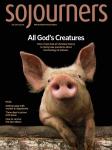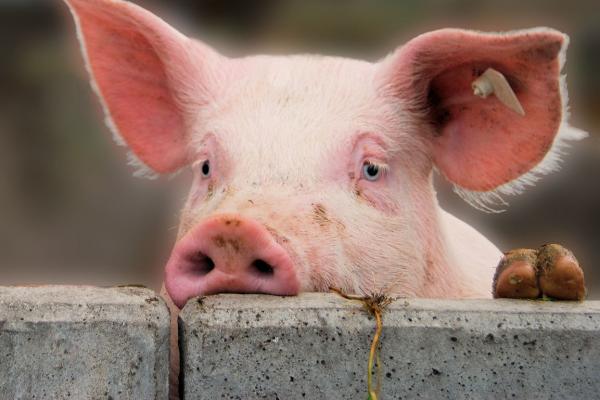AT THE HEIGHT of the culture wars in the 1980s, Cardinal Joseph Bernardin of Chicago gave a lecture at Fordham University on something he called “the consistent ethic of life.” Fortunately for those of us captured by this vision, a New York Times reporter happened to be in the audience. The next day’s headline read: “Bernardin Asks Catholics to Fight Both Nuclear Arms and Abortion.”
It got a lot of people talking. Then, as now, it was an incredibly countercultural message that disrupted the liberal/conservative binary of secular political imagination. But Bernardin’s views, though novel in a U.S. context, were articulating the principles of an ancient faith: consistent nonviolent protection and support for life in every circumstance. Within the politics of U.S. culture wars, this means refusing to make distinctions between a child dying of a treatable disease and a child killed by abortion. Instead, we insist that Christ is always with the least among us and that we must let these little children come to him. Every last one.
The most famous animal-lover
As a Catholic professor of ethics, I’ve spent most of my career thinking about what this consistent protection of life means for bioethics. As a result of my research, I’ve come to believe that the “bio” in bioethics must include how we treat the lives of animals. Or as I prefer to say: how we human animals should protect and care for nonhuman animals. After all, humans are animals too.
I’m not the only one who’s arrived at this conclusion: In his 2015 encyclical, Laudato Si’, Pope Francis appealed to a consistent life ethic to underline the urgency of addressing the global climate crisis, which threatens the lives of so many. As you might expect from a pope who named himself after the most famous animal-lover in the church, Pope Francis explicitly included nonhuman animals as intrinsically valuable parts of God’s creation in need of protection and care. “It is not enough,” he says, “to think of different species merely as potential ‘resources’ to be exploited, while overlooking the fact that they have value in themselves.” Several chapters later, Pope Francis calls on Christians to “forcefully reject the notion that our being created in God’s image and given dominion over the earth justifies absolute domination over other creatures.”
Laudato Si’ also critiqued big agriculture for “forcing smallholders to sell their land” and undervaluing crop diversity. Instead, Francis lifted up “small-scale food production systems which feed the greater part of the world’s peoples, using a modest amount of land and producing less waste.” And unlike the “economies of scale” responsible for so much animal suffering, these smaller farms are much better able to care for their animals as the kinds of creatures God created them to be.
Finally, the encyclical declared that experimentation on animals is a moral issue. “Experimentation on animals is morally acceptable only if it remains within reasonable limits [and] contributes to caring for or saving human lives,” wrote Pope Francis. “Human power has limits and it is contrary to human dignity to cause animals to suffer or die needlessly.”
Consider the ... mosquitoes?
But despite all Francis said about the broader creation, I feel compelled to note, as someone who has focused much attention on protecting nonhuman animals, where the encyclical could have been more supportive of all God’s creatures.
For one thing, where are the specifics? Almost everyone agrees that there should be “reasonable limits” on animal experimentation; given the general moral principles the pope laid out, what follows about certain kinds of experiments? With regard to which animals? Nothing about this was addressed.
And though the encyclical critiqued big agriculture and “economies of scale,” I was disappointed it lacked any specific consideration of factory farming. What about the intrinsic value of the billions of creatures who suffer so terribly in these buildings? And given the harm this style of farming also does to humans, addressing it would have been perhaps the best example the pope could have used to explain “integral ecology,” the idea that our well-being as humans is closely connected to the well-being of the earth and its creatures.
Finally, at times the encyclical unnecessarily collapses “creation” into one big undifferentiated mass of stuff. For example, the encyclical states that “we can hardly consider ourselves to be fully loving if we disregard any aspect of reality” and goes on to talk about “the love God has for each of his creatures and which also unites us.”
But any aspect of reality—really? After the encyclical’s release, people asked me on social media to defend the value of the Ebola virus. And what about the skin cells I kill when I scratch an itch on my arm? Is swatting a mosquito the moral equivalent of growing a pig in torturous conditions for profit?
Admittedly, these three topic areas require careful attention to complex and controversial issues, so perhaps they go beyond the scope of this particular encyclical. But moral theologians from both Catholic and Protestant circles are beginning to give these issues the attention they deserve, and Laudato Si’ provides a good foundation on which to build this work.
Lambs, lions, babies, snakes
But wait a minute: Didn’t God say that we have dominion over the whole earth? Didn’t God give us the animals to use for food, clothes, and labor? Didn’t God create us as the crown of creation?
It’s complicated. Yes, the first chapters of Genesis tell us these things, but they also tell us that God created animals good, period; that God gave both human and nonhuman animals plants and fruit to eat, not each other; that the reason God brings animals to Adam is “because it is not good for [humans] to be alone.”
And yes, God later gives Adam and Eve limited permission to eat meat and use animal skins to cover their bodies, but that is only after sin has entered the picture. The Peaceable Kingdom is envisioned by Isaiah as one in which lambs lay down next to lions and babies hang out with snakes. This is a return to Genesis’ vision of the Garden of Eden, a world unstained by sin, death, and violence in which all animals—human and nonhuman—lived together in peace.
The Reign of God is already here, but not yet fulfilled, and Christians have an obligation to be a witness to it. Whatever one thinks of eating or wearing parts of other animals, Christians cannot consistently be a witness to the coming Reign if we support the violence of factory farms, which torture and slaughter billions of animals every year. The dominion that God has given us over creation is one that is to imitate Christ’s nonviolence and care for those on the margins, those whose dignity is most inconvenient for us to acknowledge and who cannot speak up in their own defense.
Ancient Christian vegans
But there are serious problems everywhere we look, some argue. In a world of limited attention and effort, shouldn’t we address human injustice first?
This is an important question, but for many of us changing our eating habits with respect to other animals needn’t take away from our other justice work. For most of human history, meat was a luxury or celebration-type food. Our ancient Christian traditions were pretty hard-core when it came to refusing to eat meat. Orthodox Christians are still vegans every Wednesday and Friday. Add Meatless Monday into the mix and suddenly one is cutting nearly 50 percent of the meat from one’s diet!
But let’s return to integral ecology. It turns out that protecting nonhuman animals also protects human animals. Animal fat in our blood is a major cause of an epidemic of heart disease. Factory farms are a major contributor to climate change—and treat their mostly poor and undocumented workers terribly. And if you’re worried about drug-resistant bacteria, the amount of antibiotics we put into humans pales in comparison to what we pour into these factory-farmed animals.
It turns out that we need not choose between human and nonhuman animals when we commit to protecting and supporting the vulnerable. Our mutual fates and flourishing are bound together. Violence against one ultimately impacts the other. A consistent concern for nonhuman animals is in our best interest as well.

Got something to say about what you're reading? We value your feedback!

